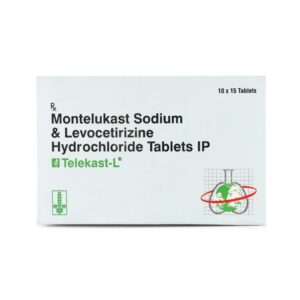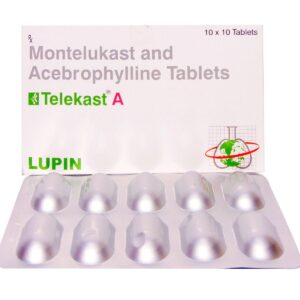MONTEKIUKAST + LEVOCETRIZINE
Montekiukast: Montelukast is a drug that belongs to a class called leukotriene receptor antagonists. It is primarily used for the treatment of asthma, both in adults and children above the age of 1, as well as for the prevention of exercise-induced bronchoconstriction.
The mechanism of action of montelukast involves blocking the action of leukotrienes, which are chemicals released in the body during asthma and allergic reactions. By inhibiting the leukotriene receptors, montelukast helps to reduce inflammation and constriction of the airways, making it easier to breathe.
The typical dose of montelukast for adults and adolescents (15 years of age and older) is once daily, usually in the evening. For children aged 6 to 14 years, the recommended dose is also once daily in the evening. For children aged 1 to 5 years, the dosing may vary based on the formulation and should be determined by a healthcare professional.
Common side effects of montelukast may include headache, gastrointestinal disturbances such as stomach pain, diarrhea, and nausea. Some individuals may experience behavioral changes, including mood swings, agitation, and irritability. While rare, severe allergic reactions and liver problems have been reported with the use of montelukast.
It’s important to note that montelukast should not be used as a rescue medication for acute asthma attacks but rather as a long-term treatment to prevent symptoms and reduce the frequency of asthma attacks. It should always be used under the guidance of a healthcare professional who can provide appropriate dosing instructions and monitor for any potential side effects.
Levocetrizine: Levocetirizine is an antihistamine drug that is commonly used to relieve symptoms associated with allergic conditions such as hay fever (allergic rhinitis), hives (urticaria), and allergic conjunctivitis. It belongs to a class of medications called second-generation antihistamines.
The main mechanism of action of levocetirizine is its ability to selectively block the H1 receptors in the body. This inhibits the release of histamine, which is responsible for causing allergic symptoms like itching, sneezing, runny nose, and watery eyes. By blocking these receptors, levocetirizine helps to alleviate the symptoms of allergy.
Levocetirizine is usually taken orally in the form of tablets or syrup. The usual recommended dose for adults and children above 12 years of age is 5 mg once daily. For children between 6 to 11 years of age, the recommended dose is 2.5 mg once daily. In infants between 6 months to 5 years, the dose is usually based on their body weight.
As with any medication, levocetirizine can cause certain side effects. Common side effects include drowsiness, dry mouth, headache, fatigue, and dizziness. These side effects are usually mild and temporary. However, in rare cases, levocetirizine can cause more serious side effects such as an allergic reaction, difficulty breathing, or changes in heart rate. If any severe side effects occur, it is important to seek immediate medical attention.
It is worth noting that levocetirizine may interact with other medications, so it is important to inform your healthcare provider about any other drugs you are taking. Levocetirizine should also be used with caution in individuals with kidney problems or those who are pregnant or breastfeeding.
Overall, levocetirizine is an effective antihistamine used to relieve allergy symptoms. However, it is important to use the medication as directed and consult with a healthcare professional if you have any concerns or questions.


